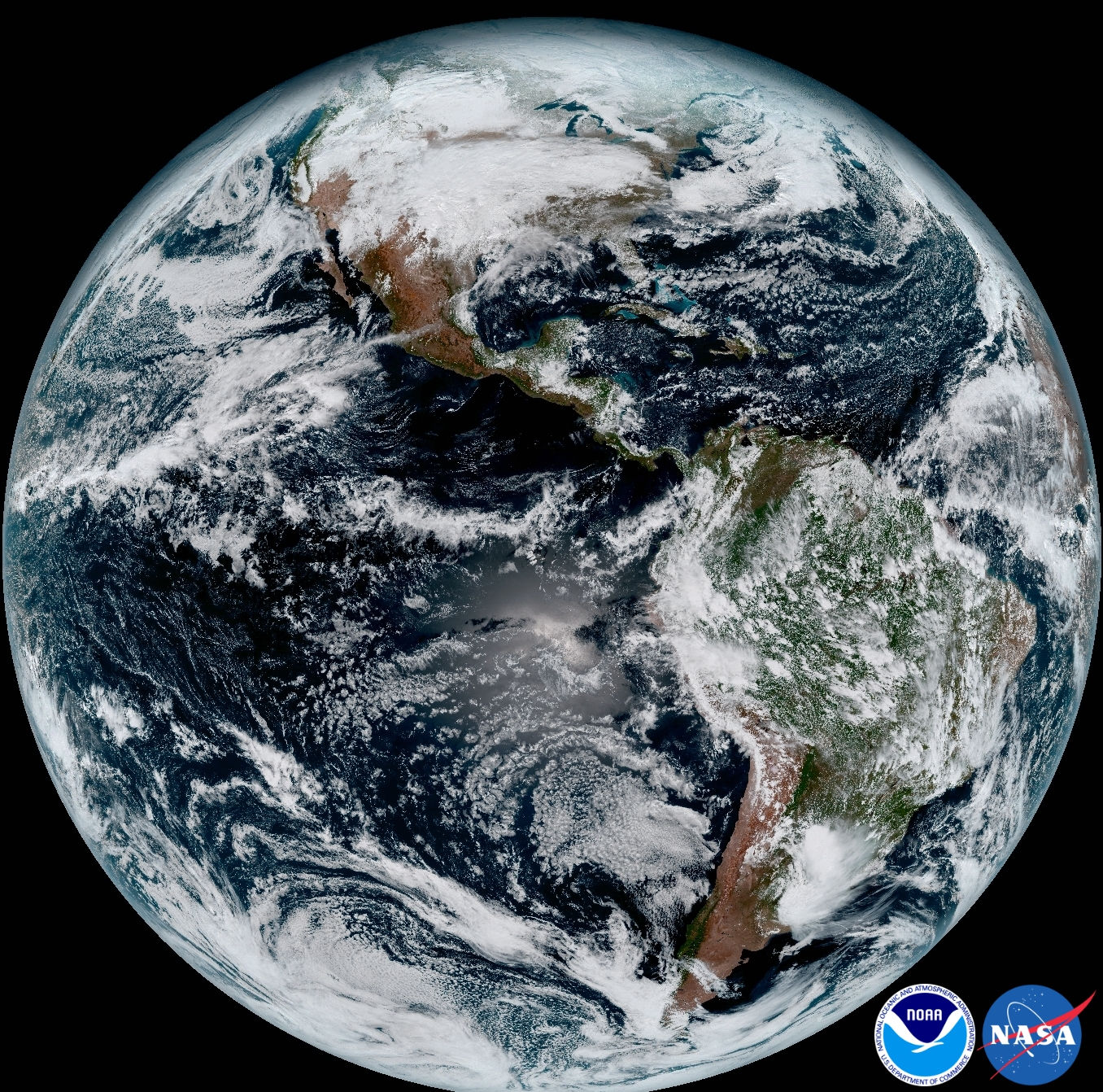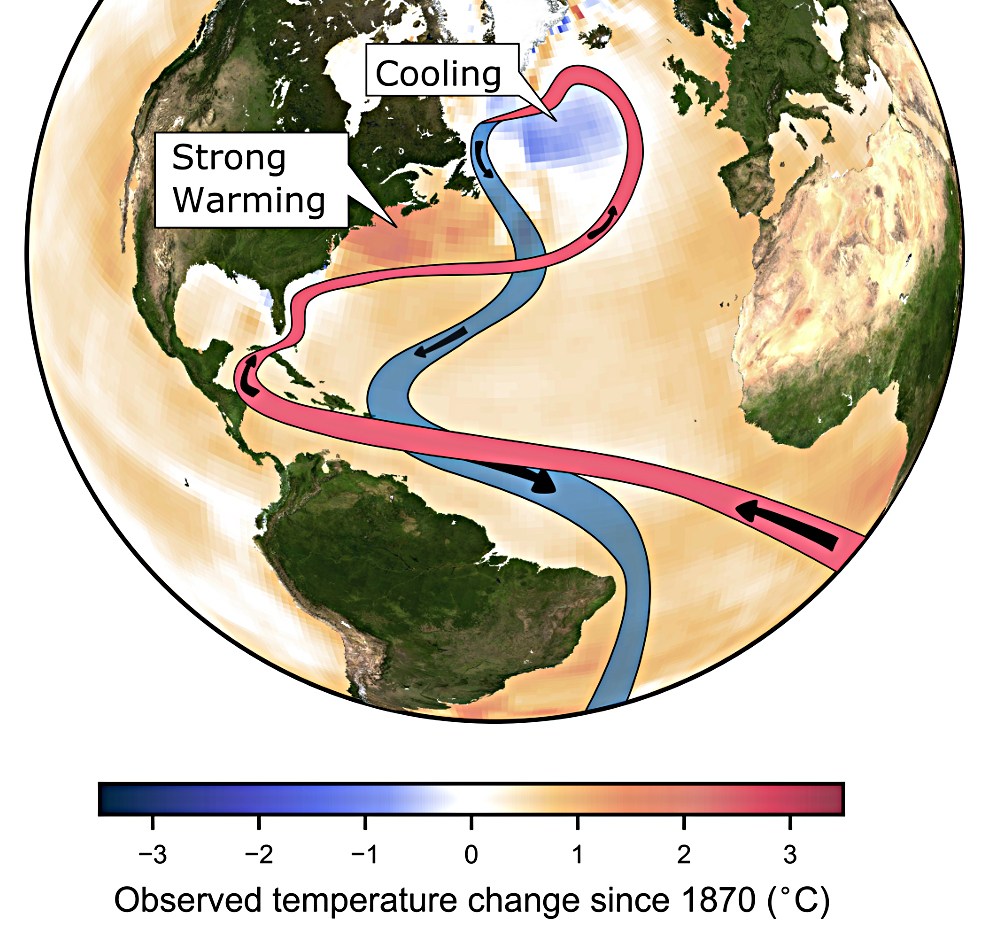
The new “Blue Marble” from NOAA’s satellite GOES-16 situated in an orbit 22,3000 miles above the Earth: NASA
By Glynn Wilson –
MOBILE, Ala. — As we wait for a massive storm that could dump seven inches of rain here to make it over from New Orleans, this is a good time to talk about the upcoming hurricane season of 2018 and the latest science news about global warming and climate change.
Climate scientists from Colorado State University have already released a prediction saying this year’s hurricane season, which officially begins June 1, could bring an above-average 14 named storms, 7 hurricanes and 3 major hurricanes.
While the Trump administration is still stifling any talk about global warming or climate change and bringing even more anti-science people into the federal agencies even as climate change denier Scott Pruitt may be on the way out at EPA, two new studies raise major alarms that the long-predicted slowing of the Gulf Stream is already in progress and could hasten sea level rise 100 years ahead of schedule.
One study published in the journal Nature, Observed fingerprint of a weakening Atlantic Ocean overturning circulation, was led by the Potsdam Institute for Climate Impact Research. It finds that the Atlantic Meridional Overturning Circulation system, another name for the Gulf Stream, has weakened “around 15 percent” since the mid-20th century, bringing it to “a new record low.”
The system circulates warmer water northward and cooler water south.
“I think we’re close to a tipping point,” climatologist Michael Mann told ThinkProgress in an email interview. The system slow down “is without precedent” in more than a millennium he said: “It’s happening about a century ahead of schedule relative to what the models predict.”
The impacts of such a slowdown include much faster sea level rise, he indicated, along with warmer sea surface temperatures, which feed hurricanes to make them stronger and more devastating when they make landfall.
Both of those effects are already being observed — and together they make devastating storm surges of the kind seen during Superstorm Sandy far more likely.
Another new study in the same issue of Nature “supports this finding and places it in a longer climate history context,” as Potsdam’s Stefan Rahmstorf notes at RealClimate, showing the Gulf Stream moving at its slowest pace in at least 1,600 years.
A video from Potsdam Institute explains how the slowdown is being driven by human-caused climate change: The observed fingerprint of temperature changes in the Atlantic are precisely what the models predicted would happen when the slowdown began in earnest.
A slow-down in deepwater ocean circulation “would accelerate sea level rise off the northeastern United States, while a full collapse could result in as much as approximately 1.6 feet of regional sea level rise,” as the authors of the U.S. National Climate Assessment said in November.
This extra rise in East Coast sea levels would be on top of whatever multi-foot sea level rise the entire world sees.
A Gulf Stream system slowdown would reduce regional warming a bit, especially in Europe, but “would also lead to a reduction of ocean carbon dioxide uptake, and thus an acceleration of global-scale warming.” The slowdown also means a rise in water temperatures off the U.S. mid-Atlantic and Northeast coasts, which has already begun (see map).

So this new research on the Gulf Stream slowdown provides evidence that human-caused global warming is responsible for a much larger fraction of the higher East Coast sea level rise that fueled the super-charged storm surge of Sandy than previously thought.
As Dr. Jennifer Francis of Rutgers University’s Institute of Marine and Coastal Sciences explained back in 2013:
“Abnormally high sea-surface temperatures all along the eastern seaboard at the time, which must have some component associated with globally warming oceans, likely helped Sandy maintain tropical characteristics longer and allowed the storm to travel farther northward than would be expected in late October. Warmer ocean waters would also increase evaporation rates, adding to the moisture and latent heat available to the storm.”
The key question has always been what fraction of the recent rise in eastern seaboard sea level rise can be attributed to global warming. Increasingly, it seems that a very large fraction can be tied directly to that phenomenon.
If this slowing trend continues, researchers fear a shutdown of the Gulf Stream’s circulation is possible in the long-term, and that would have disastrous consequences, bringing rapid sea level rise to the East Coast, more extreme winters to Europe and numerous other side effects.
“We know somewhere out there is a tipping point where this current system is likely to break down,” study co-author Stefan Rahmstorf, a climate scientist at Germany’s Potsdam Institute for Climate Impact Research, told the Associated Press. “We still don’t know how far away or close to this tipping point we might be. … This is uncharted territory.”
The slowdown is occurring with the Atlantic meridional overturning circulation (AMOC) in which warm, salty water flows northward, from the tropics toward the North Pole. From there, the water is cooled, sinks below warmer water and is carried southward along the Gulf Stream. But the slowdown means less water is turned over amid the Gulf Stream.
The AMOC has slowed 15 percent since the mid-20th century, the study also concluded.
Global warming is to blame for this slowdown in several ways, according to the study. One is that, despite being colder than the surrounding water, the ocean is simply warmer, and the cold water that’s supposed to sink under the warm water just isn’t as cold anymore. Also, melting sea ice is adding more fresh water to the mix, which makes it less dense and therefore less likely to sink.
“It’s a slow change at the moment, but we’re changing it,” Levke Caesar, a physicist at Potsdam Institute and a co-author of the study, said. “One danger is in the unknown of what will happen. We should expect changes.”
The study was performed by Caesar, Rahmstorf and researchers from institutions in Germany, Greece, Spain and NOAA. The size of the cold zone studied measures about 2 million square miles, or about the size of India and Mexico combined.
“If we do not rapidly stop global warming, we must expect a further long-term slowdown of the Atlantic overturning,” Alexander Robinson, a co-author of the second study, told The Guardian. “We are only beginning to understand the consequences of this unprecedented process – but they might be disruptive.”

The original “Blue Marble” from Apollo 17 (Dec. 7, 1972): NOAA













